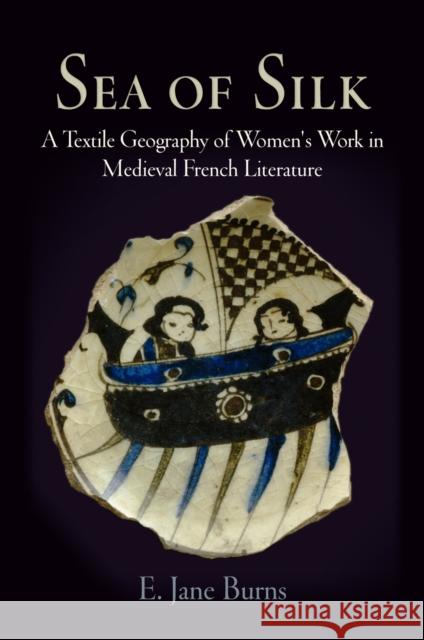Sea of Silk: A Textile Geography of Women's Work in Medieval French Literature » książka
Sea of Silk: A Textile Geography of Women's Work in Medieval French Literature
ISBN-13: 9780812241549 / Angielski / Twarda / 2009 / 272 str.
Sea of Silk A Textile Geography of Women's Work in Medieval French Literature E. Jane Burns "Burns shifts our focus from questions of the consumption of silk to those of its production and circulation; in so doing, she weaves a gendered history of the role this luxury textile has played in the social and libidinal economy of cultural exchange."--Sharon Kinoshita, University of California, Santa Cruz The story of silk is an old and familiar one, a tale involving mercantile travel and commercial exchange along the broad land mass that connects ancient China to the west and extending eventually to sites on the eastern Mediterranean and along sea routes to India. But if we shift our focus from economic histories that chart the exchange of silk along Asian and Mediterranean trade routes to medieval literary depictions of silk, a strikingly different picture comes into view. In Old French literary texts from the twelfth and thirteenth centuries, emphasis falls on production rather than trade and on female protagonists who make, decorate, and handle silk. Sea of Silk maps a textile geography of silk work done by these fictional women. Situated in northern France and across the medieval Mediterranean, from Saint-Denis to Constantinople, from North Africa to Muslim Spain, and even from the fantasy realm of Arthurian romance to the historical silkworks of the Norman kings in Palermo, these medieval heroines provide important glimpses of distant economic and cultural geographies. E. Jane Burns argues, in brief, that literary portraits of medieval heroines who produce and decorate silk cloth or otherwise manipulate items of silk outline a metaphorical geography that includes France as an important cultural player in the silk economics of the Mediterranean. Within this literary sea of silk, female protagonists who "work" silk in a variety of ways often deploy it successfully as a social and cultural currency that enables them to traverse religious and political barriers while also crossing lines of gender and class. E. Jane Burns is Druscilla French Distinguished Professor of Women's Studies at the University of North Carolina, Chapel Hill. She is author of Courtly Love Undressed: Reading Through Clothes in Medieval French Culture and Bodytalk: When Women Speak in Old French Literature, both also available from the University of Pennsylvania Press. The Middle Ages Series 2009 272 pages 6 x 9 25 illus. ISBN 978-0-8122-4154-9 Cloth $59.95s 39.00 World Rights Literature, Women's/Gender Studies Short copy: E. Jane Burns argues that literary portraits of medieval heroines who produce and decorate silk cloth or otherwise manipulate items of silk outline a metaphorical geography that includes northern France as an important cultural player within the silk economics of the Mediterranean.











